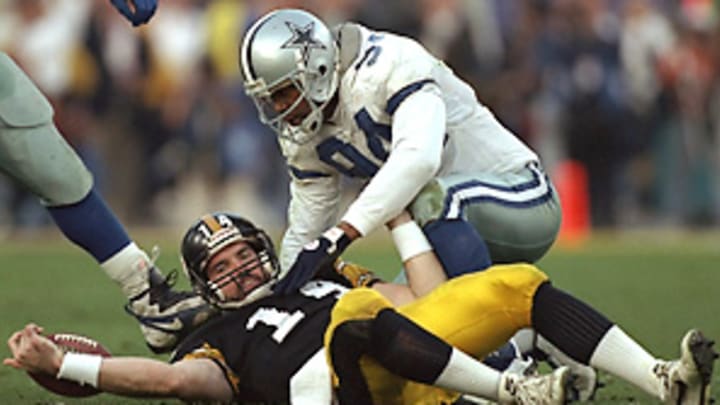It's time former Cowboy Charles Haley gets due with spot in Hall

He was elected to the Pro Football Hall of Fame three weeks ago, and no fan of data analysis can argue.
In this era of stats-mean-absolutely-everything-because-you-can't-debate-numbers mindlessness, what, exactly, is there to say about Emmitt Smith that would exclude him from immortality? In 15 seasons, Smith rushed for an NFL-record 18,355 yards. He won three Super Bowl rings, was selected to eight Pro Bowls and scored 175 touchdowns. He is widely considered to be the greatest running back in NFL history.
Yet at the same time Smith was cruising into Canton, a more worthy player remained on the outside, inexplicably barred from glory. Is Charles Haley one of the elite defensive ends of all time? Undoubtedly. Is he the man who made the difference between the good-yet-jewelry-deprived Cowboys of Aikman-Emmitt-Irvin and the brilliant-and-ring-adorned Cowboys of Aikman-Emmitt-Irvin? Undoubtedly. Most importantly, is he a winner? A superstar who carried franchises to higher levels?
A record five Super Bowl titles don't lie.
"I'm not a big Hall of Fame person, because I think it's a team sport," Jimmy Johnson, the former Cowboys coach, recently told the Dallas Morning News. "But without question, I think Charles Haley's a Hall of Famer.
So why was Haley, now in his 11th year of retirement, turned down for the fifth-straight time by the so-called football experts who gauge Hall worthiness?
Two answers:
A. Because pass-rushing defensive ends don't compile the otherworldly eye-popping figures of offensive players.
B. Because he was crazy.
Well, not crazy, per se. What Charles Haley was -- still is -- is bipolar. Though never officially diagnosed until seven years ago, Haley was prescribed anti-depressants early on in his career. Yet he only took his medication sporadically. Like once a week. Or once a month. Or once a season. He was prone to outlandish acts that made Shannon Hoon seem tame, ranging from urinating on a teammates' steering wheel to threatening to kill Steve Young (when the two were teammates in San Francisco). While researching a book on the '90s Cowboys several years ago, I was relayed one Haley story after another, each fable concluding with me lathering my hands in soap.
One in particular perfectly summed up Charles -- cruel, ruthless, biting -- sans meds. After signing with the Dallas Mavericks as a rookie in 1993, Jamal Mashburn was given a tour of the Cowboys' locker room. He was 21-years-old, new to town, nervous as nervous can be. As Mashburn went from Cowboy to Cowboy, shaking hands and exchanging pleasantries, he was interrupted by a loud yell. "Hey Jamal! Haley screamed for all to hear. You should spend some money and get your teeth fixed!" Mashburn, naturally, was mortified.
Yet for all of Haley's negatives (and make no mistake, within the Dallas locker room he was avoided like Chlamydia), teammates are mature enough to state the obvious: Without Haley, the '90s Cowboys win zero Super Bowls. With him, they won three. As soon as he arrived from San Francisco before the 1992 season, the Dallas defense was transformed. A unit that ranked 17th in the NFL one year earlier was now fifth. A unit that had 23 sacks one year earlier now compiled 44.
Upon reading my book, James Washington, a Dallas safety, took me to task. "I can't argue with some of what you wrote," he said. "But Charles Haley was a monster on the field. The man was absolutely dominant. He doesn't get the credit he deserves, and never has."
Emmitt Smith, on the other hand, gets too much. Always has. Countless teammates will admit to this, though rarely on the record. Unlike Walter Payton, the man who used to hold the all-time rushing yard record, Smith ran behind one of the greatest offensive lines in NFL history, lined up behind one of the top quarterbacks in NFL history (Troy Aikman) and had one of the most innovative offensive coordinators in NFL history (Norv Turner). He was strong and stubborn and tough but -- from a pure talent standpoint -- was closer to a James Brooks than Payton or Jim Brown.
Worst of all, he was selfish. As Smith's fame increased and his numbers mounted, he turned increasingly self-absorbed. He often refused to sign autographs for fans, and instructed his agents to market him not as an athlete, but as a brand. By the time Smith departed Dallas after the 2002 season, most Cowboys were thrilled to see him go. At Irvin's Hall of Fame induction ceremony three years ago, roughly 25 Cowboy players mingled with the fans, talking, laughing, signing autographs and telling old stories. Smith sat alone -- behind his personal bodyguard. Not surprising, one Cowboy told me. Emmitt was being Emmitt.
Haley, on the other hand, was Haley.
Difficult. Ornery. Annoying. Rude.
Legendary.
